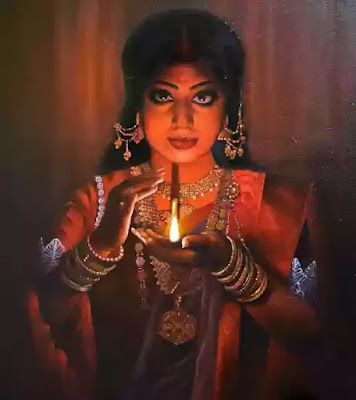Also Read
The last but not the least important woman character in the novel is Ponni. She is the wife of Mari, a village blacksmith of Sukkur. She is a peasant woman who is frank, forthright, practical-minded and strong willed. She is glib of tongue and admits her temperamental candour before the priest of the village temple saying, "God has not blessed me with an artful tongue. I utter what I have in my mind." She is poor as the income from their traditional occupation is limited. She has in her abundant milk of human kindness. She possesses an understanding and sensitive nature although she appears to be rough and barbarous in the manner and language she uses for her husband. She scolds him for his follies and holds him under her complete sway. She exhorts Savitri frankly that a husband has to be kept under tight control otherwise he is likely to go astray. She relates to her the incident that she beats Mari when he comes home drunk and starts breaking vessels. Mari is mortally afraid of her. She tells him threateningly that he must go to the village in search of a job for Savitri when he tries to escape the situation.
Ponni is kind and considerate to Savitri. She persuades her successfully to come to their house in the village. Despite her poverty, she offers fruits and coconut to her as she knows that Savitri, being of an upper caste, may not accept the tood cooked by her. She cannot bear her to suffer the pangs of hunger as Savitri refuses to take anything which has not been earned by her own hard work. She goes, along with Savitri, to the village priest for getting a job for her in the temple. When the priest puts embarrassing questions to Savitri, she reacts sharply and tells him not to embarrass the lady like this. The priest feels peeved at this. He refuses to give a job. Ponni, being practical-minded, knows how to handle such a person. She tells the priest in no uncertain terms that he should immediately take back all the junk he has given to her husband for repairs or she will throw them away into the street. This threat works and the priest agrees to give Savitri a cleaning and sweeping job in the temple on half a measure of rice and a quarter of an anna each day. Ponni is always sympathetic to her. She tries to persuade Savitri to go back home. She is overjoyed when she is told by Savitri that she has decided to go back home. She comes along to see her off. On the way, she persuades a cart-driver to take her to the town.
Ponni has an innate moral strength and an element of sturdiness in her character. She is used to the harsh, unfavourable situations which are a natural feature of her poor hard life. On the basis of her qualities of resilience and stead fastness, she reveals confidence while face-to-face with difficult turn of events. Savitri glaringly lacks that sort of strength and confidence. She picks up some of it after her coming in contact with her. No other female character in the novel is a match for her in terms of sturdiness, moral strength and a confident management of the situation of crisis. She towers above them all in moral qualities despite the handicaps of her low social status, poverty and lack of education. True to the saying that adversity makes strange bed-fellows, a relationship of understanding and sympathy comes into being between Savitri and Ponni inspite of the differences in their social status and upbringing. Human bonds know no man-made barriers of status etc. She comes closest to her in crucial time of crisis and acts as her saviour. It is beside the point too say that The Dark Room is written mainly from the point ot view of a woman. This is for the first time that the author gives predominance to women characters. The monstrous world of male-ego is relentlessly exposed to the point of ridicule and repugnance. No other novel of Narayan perhaps matches the present one in this respect.
To sum up, The Dark Roon provides an interesting variety of women characters. Each of them represents a particular point of view. They share common points and strongly differ on dissimilar points amongst themselves. A study in comparison and contrast of these women yields a wide- ranging spectrum of womanhood. Moreover, the present novel remains unparalleled vis-a-vis Narayan's other two previous novels i.e. Swami and Friends and The Bachelor of Arts as it delineates a female character, Savitri, around whom the main action of the novel revolves. She assumes the proportions of a heroine as her portrayal is a distinct improvement upon previous women characters. She is endowed with an individuality and an assertiveness that does not go the whole hog but gets ignited into a spark of independence and resistance to injustice and excesses when they cross all limits. She is not an all-out rebel against the age-old tyranny and cruelty committed on women in the traditional male dominated ethos of the Indian society. Still, she represents a departure from the Malgudian woman whose badge has been to live a home-bound life of non-entity, subservience and uncomplaining submissiveness. She recognises the limits of her protest in the given social environment. That is why when she returns home, she is more experienced, matured and balanced than she is before she leaves home. While out of home, she passes through a series of ripening and chastening experiences of the unknown unreal world of an independent entity which transform her personality to an extent. On her coming back home, she reflects "a part of me is dead", the part that makes her a worrying and fussing person at the hoot of Ramani's car so that' "the lord's homecoming might be smooth and without annoyance."
